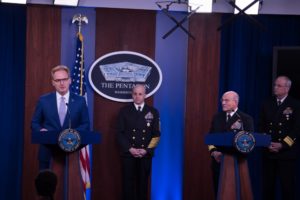A recent Congressional Research Service (CRS) report laid out how the COVID-19 pandemic could impact the Navy’s shipbuilding programs and noted what action Congress has taken in the past to mitigate other events.
The report, Navy Force Structure and Shipbuilding Plans: Background and Issues for Congress, was last updated March 27 and notes COVID-19 will not uniquely affect Navy shipbuilding, but it could impact shipyards that build, overhaul, repair, and maintain ships as well as their associated supplier firms and employees.

CRS noted shipyards and supplier firms could be affected if employees remain at home because they are ill from COVID-19, to maintain social distancing, taking care of children due to school closures, or taking care of family ill from the virus.
“Impacts on operations at shipbuilding supplier firms could affect operations at the shipyards, even if staffing at the shipyards themselves is not substantially affected, due to reduced or delayed deliveries to the shipyards of supplier-provided components and materials,” the report said.
Moreover, delays, ship construction and fabrication of their components “could put shipyards and supplier firms at risk of not being able to meet their contractual obligations, which in turn could affect their financial situations.”
CRS paid special attention to what the Navy’s calls its highest priority program, the Columbia-class ballistic missile submarine (SSBN).
The Columbia-class has a special susceptibility due its priority and “the program’s tight schedule for designing and building the lead boat in time for the boat to be ready to conduct its scheduled first strategic nuclear deterrent patrol in 2031, and the potential consequences for the nation’s strategic nuclear deterrent posture if the lead boat is not ready in time to conduct that patrol.”
Last year, the Columbia-class program manager said the Navy has little margin for the new submarine since the service already extended the service life of existing Ohio-class SSBNs to 42 years (Defense Daily, May 8, 2019).
Last week, Assistant Secretary of the Navy for Research, Development and Acquisition James Geurts told reporters they are watching Columbia work closely because of its importance (Defense Daily, March 26).
“And that may be an area where, if there’s resource contention or whatnot that we’re going to have to ensure that we prioritize that work. Have not seen any major impacts to that work yet, but we are tracking it very closely.”
CRS listed three examples when government took extraordinary measures for shipyards after unforeseen issues affected the country.
In 2005, after Hurricane Katrina hit the U.S, Congress provided $1.7 billion in reallocated emergency supplemental appropriations to pay estimated higher shipbuilding costs for 11 ships under construction at Huntington Ingalls Industries’ [HII] Ingalls Shipbuilding yard in Pascagoula, Miss., and the Avondale shipyard.
Then, the 2009 American Recovery and Reinvestment Act responding to the 2008-2009 financial crisis and recession appropriated $100 million for Maritime Administration to be used for making supplemental grants to small shipyards as authorized under the fiscal year 2009 defense authorization law.
CRS’s last example noted after Hurricane Michael caused damage in 2018 the Department of Homeland Security (DHS) granted extraordinary contractual relief to Eastern Shipbuilding Group, the builder of the Cost Guard’s new Offshore Patrol Cutters.
DHS was acting on legislation authorizing certain agencies to “provide certain types of extraordinary relief to contractors who are encountering difficulties in the performance of federal contracts or subcontracts relating to national defense,” the report said.
Geurts also told reporters the Navy is trying to help mitigate financial issues with the shipbuilders by accelerating contract awards now (Defense Daily, March 25).
Last week, Acting Secretary of the Navy Thomas Modly said they had not seen any shipyard delays due to COVID-19 yet but expect issues to crop up going forward (Defense Daily, March 24).
“To date we haven’t seen any sort of perturbations in that right now, but we are anticipating that there will be, and we’re looking at what that might cost with respect to helping the shipyards maintain their viability if they have to slow down and miss certain production milestones,” Modly said during a press conference March 24.